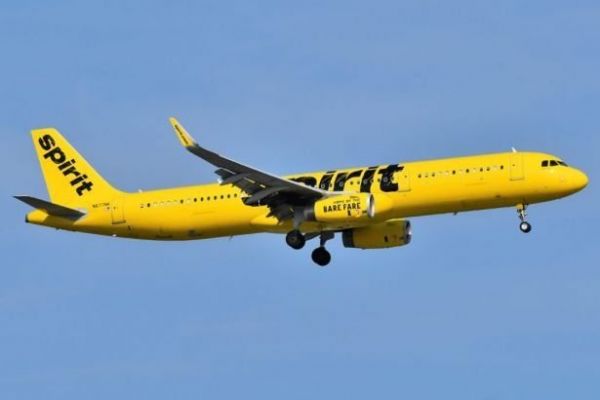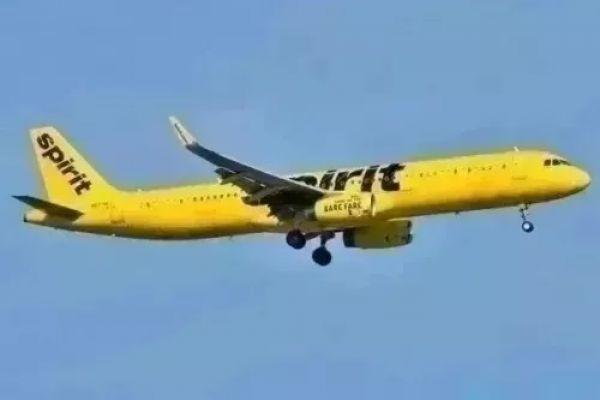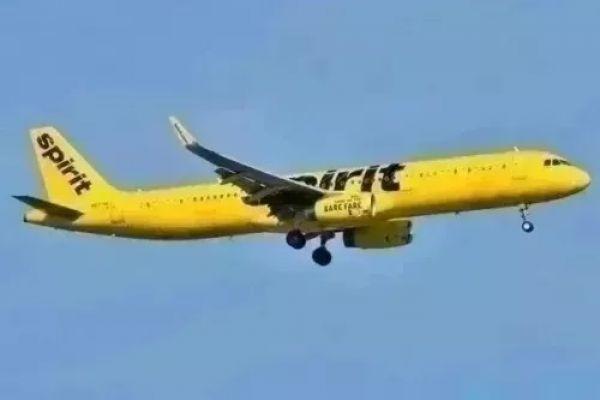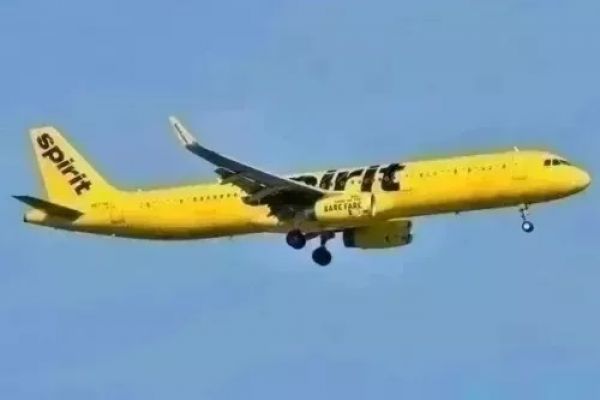Budget carriers Frontier Group Holdings and Spirit Airlines Inc have unveiled plans to create the fifth-largest US airline in a $2.9 billion tie-up likely to tighten competition against traditional carriers.
The proposal to form a new no-frills carrier controlled by Frontier Airlines pushed up shares of Spirit as much as 18.7%, though several analysts pressed the airlines over possible difficulties in obtaining regulatory approval.
"In a competitive industry like ours, the lowest costs always win," Frontier chief executive Barry Biffle told analysts. "These low costs will, in turn, enable us to keep our fares low for customers."
The move comes at a time when the US airline industry is grappling with volatility in travel demand due to new COVID-19 variants. At the same time, costs are soaring on a combination of rises in wages, fuel prices and airport charges.
Spirit's wage expense as a percentage of revenue shot up by more than 10 points last year versus 2019. Higher fees prompted Frontier to exit airports such as Los Angeles and San Jose in California, and stop serving Washington-Dulles and Newark.
The merger, which is expected to close in the second half of 2022, is projected to result in synergies of $500 million a year, mainly through operational savings.
The companies pledged to avoid any job losses and add 10,000 direct jobs by 2026. They also promised that the merger would deliver $1 billion in annual consumer savings and offer more than 1,000 daily flights to over 145 destinations.
Peter McNally, global sector lead for industrials, materials and energy at research firm Third Bridge, said that cost pressure is the biggest threat to recovery in the airline industry's profit.
The merged company would be in an "excellent" position to combat rising operating costs, McNally said.
Antitrust Hurdle
But some analysts warned that the deal could face opposition from the White House as US President Joe Biden's administration takes a tough stance on big corporate mergers.
The Department of Justice (DOJ) declined to comment on the merger proposal. A White House spokesperson did not comment on the proposal but said that the administration "is committed to protecting competition across a wide range of industries for the benefit of consumers."
The DOJ has filed an antitrust lawsuit against American Airlines Group Inc and JetBlue Airways Corp over their partnership, alleging that it would lead to higher fares in busy Northeastern US airports.
Biffle acknowledged that the Frontier-Spirit deal would require DOJ approval but predicted that it would be "well received" by regulators because it would lead to "low fares to more people in more places".
Data from Cirium, an aviation data company, shows that the two carriers overlap in only 18% of their routes.
Renowned airline investor Bill Franke, a pioneer of rock-bottom fares coupled with top-up charges offered by ultra low-cost carriers (ULCC), will be chairman of the new airline, whose brand name and CEO have not been announced.
Franke's private equity firm Indigo Partners, which is Frontier's majority shareholder, had previously invested in Spirit which was once considered a suitor for Frontier.
Ultra low-cost carriers are a tier below Southwest Airlines, which pioneered the low-cost concept in the 1970s, and they have continued to expand during the COVID-19 pandemic.
The companies expect the deal to accelerate investment and help take on major US airlines like American, Delta Air Lines, Southwest and United Airlines Holdings.
The merger would be worth $6.6 billion including the assumption of net debt and operating lease liabilities.
Colorado-based Frontier would own a 51.5% stake in the combined entity.
Under the cash-and-stock deal, Spirit's shareholders would receive $25.83 per share, a premium of 18.8% to Friday 4 February's close.
Both airlines use Airbus SE jets and signaled they were not looking at cancelling airplane orders.
Frontier, Spirit Tie-Up Will Face Close US Review - Lawyers
The above news was followed by news that the bid by budget carriers Frontier Group Holdings and Spirit Airlines Inc to create the fifth-largest US airline will face close scrutiny from the Justice Department, lawyers have said.
The Biden administration has made injecting more competition into U.S. industries a key priority.
Andre Barlow, an antitrust lawyer at Doyle, Barlow & Mazard LLC, said that in the "antitrust environment" the airlines would have trouble getting the deal past the department's Antitrust Division.
"Given the administration's stance against mergers, it will be difficult for these two low-budget competitors to convince the antitrust enforcers that its merger will lead to lower prices," he said.
"DOJ will focus on whether the two airlines overlap with respect to city pairs and whether the combination of two budget airlines would result in higher prices for consumers," Barlow said.
Kenneth Quinn, a partner at Clyde & Co, said however that the DoJ would have a "hard time blocking this merger."
"You've got two ultra-low-cost carriers with a common fleet without a lot of competitive city pair overlap," he said.
In September, the administration said that it planned to award 16 slots for flights at Newark International Airport in New Jersey to a yet-to-be-determined low-cost carrier.
The slots were previously owned by United Airlines and then transferred to Southwest Airlines before being given up. United advocated for them to be retired to reduce congestion.
Last month, the Transportation Department issued a new rule to make it easier for regulators to move faster to protect airline customers from unfair and deceptive practices. It plans future rules on airline ticket refunds and transparency of airline baggage and other fees.
American and three other airlines control over 80% of the US domestic air market.
Tim Wu, a White House adviser on technology and competition policy, in 2018 argued that consolidation resulted in the largest US airlines "finding ways to give less for more: fewer flights (more crowded planes), smaller seats, fewer flight attendants, higher baggage and change fees and a stubborn resistance to lowering fares."
Indigo's Franke Bets On Winning Cost Formula For Frontier-Spirit Airline
The above news was also followed by news that veteran budget airline investor Bill Franke has pledged to avoid what he once called the "path to hell" after masterminding a $2.9 billion merger of discount airlines - letting dealmaking get the better of tight cost controls that support low fares.
The 84-year-old entrepreneur has turned his private equity firm's initial $36 million in Frontier Group Holdings into a stake worth $2.4 billion in the agreed merger with Spirit Airlines Inc - a rare feat in high-risk airline deals.
As noted above, Frontier and Spirit unveiled their plans to create the fifth-largest US airline, valuing Florida-based Spirit at approximately $2.9 billion excluding debt.
After spearheading the low-cost strategy at both airlines - having previously served as a chairman and key shareholder of Spirit and now Frontier - Franke is no in mood to relax the simple formula that underpins his investments on three continents.
"The trick is being disciplined about cost structure," Franke told Reuters in an interview.
Franke has long been a pioneer of ultra-low cost airlines like Frontier and Spirit, which occupy a tier of the market below long-established budget rivals like Southwest.
Such airlines rely on offering a fare stripped back to its lowest possible level, topped up by charges for extras like booking through a call center, a strategy known as unbundling.
The business also keeps a laser focus on serving tourism or visits to relatives, without chasing after business travelers.
Such carriers were among the first to recover from the pandemic.
"There's been a rebound in booking in the U.S. though most of them is the class we call visiting family and friends rather than business travel," Franke said. "We're optimistic because there is pent-up demand. Consumers still like to pay low prices."
Business Model
The pledge to maintain low costs and fares appears directed in part at US regulators who will closely review the merger deal, amid increased scepticism about takeovers under the Biden administration, according to lawyers.
But it also reflects Franke's reluctance to make compromises on the business model purely for the sake of expansion - a message unlikely to be lost on other airlines in which his investment firm owns shares, like Europe's Wizz Air.
While Frontier, Spirit and Wizz all have similar business strategies, Wizz Air triggered concerns among some analysts about its ability to expand without losing control of costs when it made an approach to Britain's easyJet last year.
EasyJet rejected the approach and Wizz Air, which never confirmed the move, subsequently said it preferred organic growth without being "blind" to other opportunities.
Franke began his airline career at then-bankrupt America West Airlines, which later acquired US Airways and was then bought out by American Airlines.
His airline-focused buyout firm, Indigo Partners, owns stakes in Wizz Air, JetSMART of Chile and Mexico's Volaris, as well as 83% of Colorado-based Frontier, valued at $2.7 billion.
It is expected to own approximately 43% in the combined entity following the merger of Frontier and Spirit.
Indigo, which Franke founded in 2002, paid $36 million to acquire ownership and assume the debt of Frontier from Republic Airways Holdings Inc in 2013 after selling shares in Spirit.
Franke rebranded Frontier as a low-cost, no-frills carrier, flying its jets for longer hours and eliminating some destinations served by major US airlines.
Indigo took Frontier public in April of 2021 after the airline grew to become a US regional player and following the COVID-19 pandemic, which had upended air travel worldwide.
Frontier was valued at $4.5 billion in that offering, which raised $300 million for the airline and another $300 million for Indigo. It closed on Monday 7 February at $12.82 per share, for a market value of $2.8 billion - still a 66-fold gain on Franke's gamble.
News by Reuters, edited by Hospitality Ireland. Click subscribe to sign up for the Hospitality Ireland print edition.









